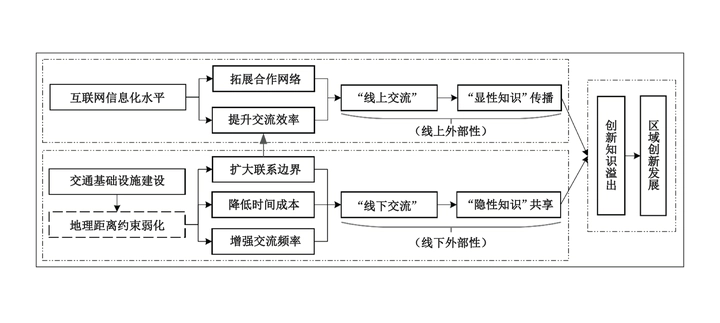互联网时代“线下交流”不再重要了吗——基于“知识空间溢出”悖论与区域创新的检验
Is “Offline Communication” No Longer Important in the Internet Era? Test from the Paradox of “Knowledge Spatial Spillover” and Regional Innovation [in Chinese]
Abstract: Innovation is the primary driving force behind development. In the Internet era, innovation knowledge spillover is faced with two paradoxes: One is the increasing frequency of “online communication” and the decreasing opportunity of “offline communication”, and the other is the insufficient innovation effect of “codified knowledge” and the limited communication channel of “tacit knowledge”.
By using the level of the Internet informatization and the construction of transportation infrastructure to measure the intensity of “online communication” and “offline communication” respectively, and collecting a sample of 283 prefecture-level cities from 2007 to 2019, this paper applies the spatial panel Durbin model to study the impact of online “codified knowledge” communication and offline “tacit knowledge” sharing on the quantity and quality of regional innovation. The results indicate that, after controlling the spillover effect of knowledge, “online communication” and “offline communication” cannot completely substitute each other. Although “online communication” can effectively increase the innovation quantity in local and adjacent areas, it has a limited effect on innovation quality. Only by combining the efficiency of “online communication” represented by the Internet informatization with the improvement of “offline communication” represented by high-speed rail construction, one can make the comprehensive utilization of “codified knowledge” and “tacit knowledge” to improve the quality of regional innovation.
The main contributions of this paper are as follows: First, it distinguishes the different transmission channels between “codified knowledge” and “tacit knowledge”, the former mainly through “online communication” and the latter through “offline communication”, and points out that the combination of “online communication” and “offline communication” is the key to solve the paradox of “knowledge spillover”. Second, it acquires data of transportation time and frequency between cities to capture the improvement of “offline communication” by weakening the geographical distance. Third, it applies the two-way fixed effect spatial panel Durbin model to analyze the spatial spillover from neighboring areas, and systematically investigate the effect of the Internet and transportation infrastructure on the quantity and quality of regional innovation.
互联网时代“线下交流”不再重要了吗——基于“知识空间溢出”悖论与区域创新的检验
创新是引领发展的重要动力。文章用互联网信息化水平和交通基础设施建设分别衡量 “线上交流”与“线下交流”的便利程度,通过收集2007−2019年283个地级市的面板数据,构建空间面板杜宾模型,实证研究了线上“显性知识”交流与线下“隐性知识”共享对区域创新成果数量和质量的影响。研究结果显示,考虑了知识在空间上的溢出效应之后,“线上交流”与“线下交流”并非完全替代关系。虽然“线上交流”可以有效提升本地区和邻近地区的创新成果数量,但对创新成果 质量的影响十分有限。只有把互联网信息化发展带来的“线上交流”与交通基础设施建设实现的“线下交流”相结合,才能综合利用“显性知识”和“隐性知识”提升区域创新成果质量。文章的研究为持续推进以高铁为代表的国家综合立体交通网、工业互联网新型基础设施建设以及提升中国创新成果的数量和质量具有重要启示意义。
基金项目
- 国家自然科学基金优秀青年项目(72222007);国家自然科学基金面上项目(71973097);国家自然科学基金重点项目(72031006);国家社会科学基金重大项目(18ZDA047)
作者简介
郑维伟(1997−),男,重庆人,上海交通大学安泰经济与管理学院博士研究生;
瞿茜(1985−)(通讯作者),女,江苏南通人,上海交通大学安泰经济与管理学院副教授,博士生导师;
刘耀彬(1970−),男,湖北麻城人,南昌大学经济管理学院教授,博士生导师;
安玲林(1997−),女,湖北恩施人,重庆大学经济与工商管理学院硕士研究生。
